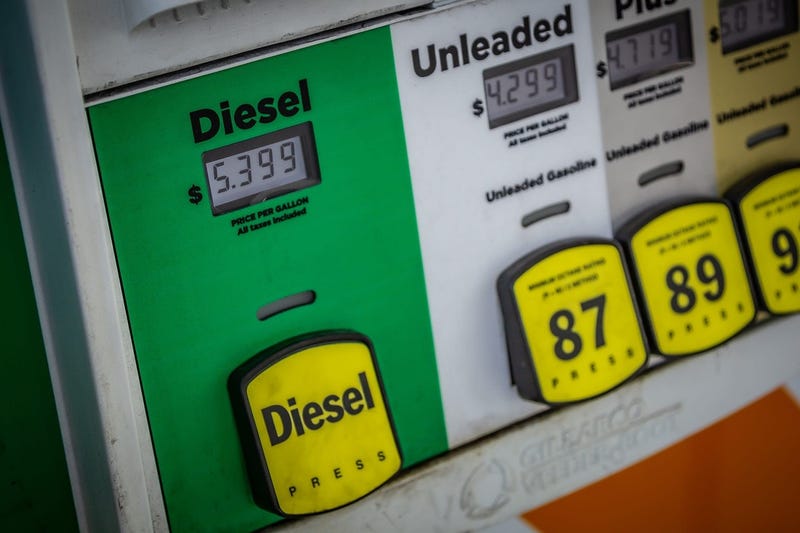
The price of diesel fuel hit an all-time high in the United States on Tuesday,
The average price of a gallon of diesel is up to $5.55, according to AAA. That's an increase of nearly 20 cents from just a week ago and 51 cents more than last month.
This time last year, a gallon of diesel cost only $3.11.
Some cities, especially along the East Coast, are seeing even higher prices surpassing $6 per gallon.
The increase at the pump is primarily due to the high cost of crude oil, which was hovering near $100 a barrel last week and is now closing in on $110.
"With the cost of oil accounting for more than half of the pump price, more expensive oil means more expensive gasoline," AAA spokesperson Andrew Gross said in a statement.
Russia's war in Ukraine and increasing gas demand have also pushed pump prices higher. As long as oil prices remain above $105 per barrel, AAA says we will continue to see those eye-popping prices at the pump.
Patrick De Haan, head of petroleum analysis at GasBuddy, told CNBC that higher diesel prices are "certainly going to translate into more expensive goods," as companies pass the higher fuel costs onto consumers.
"Especially at the grocery store, the hardware store, anywhere you shop," he said. "It's going to be a double whammy on consumers in the weeks and months ahead as these diesel prices trickle down to the cost of goods — another piece of inflation that’s going to hit consumers."
Small trucking companies are really feeling the strain from skyrocketing prices. Wisconsin-based Herlache Truck Lines, for example, is paying more money to fuel trucks for just one month than it cost to run the entire fleet last year.
"If fuel expense stays as high as it has been for the past two months, our annual budget for fuel is going to be up by $300,000. We're going to spend almost $1 million on fuel this year," company president Tom Herlache told KSNV-TV.
Because demand for trucks and consumer goods is so great at the moment, analysts say the higher prices won't lead to less trucks on the road.
More than 70% of the nation's freight is transported via trucks, according to the American Trucking Associations. In 2019, freight trucks used 36.5 billion gallons of diesel fuel.
While larger companies can pass off some of the fuel costs to consumers, not everyone has that luxury. Independent truckers and small trucking companies often operate in markets that don't always compensate for the increased cost of fuel, according to Ron Faulkner, president of the California Trucking Association.
"The impact to small fleets is especially concerning because more than 95% of the trucking companies in the country operate 20 or fewer trucks. These companies are the backbone of the industry and are struggling to keep up with out-of-control costs," Faulkner wrote in an op-ed in the Fresno Bee.
At this rate, analysts don't expect to see diesel fuel costs going down any time soon.


